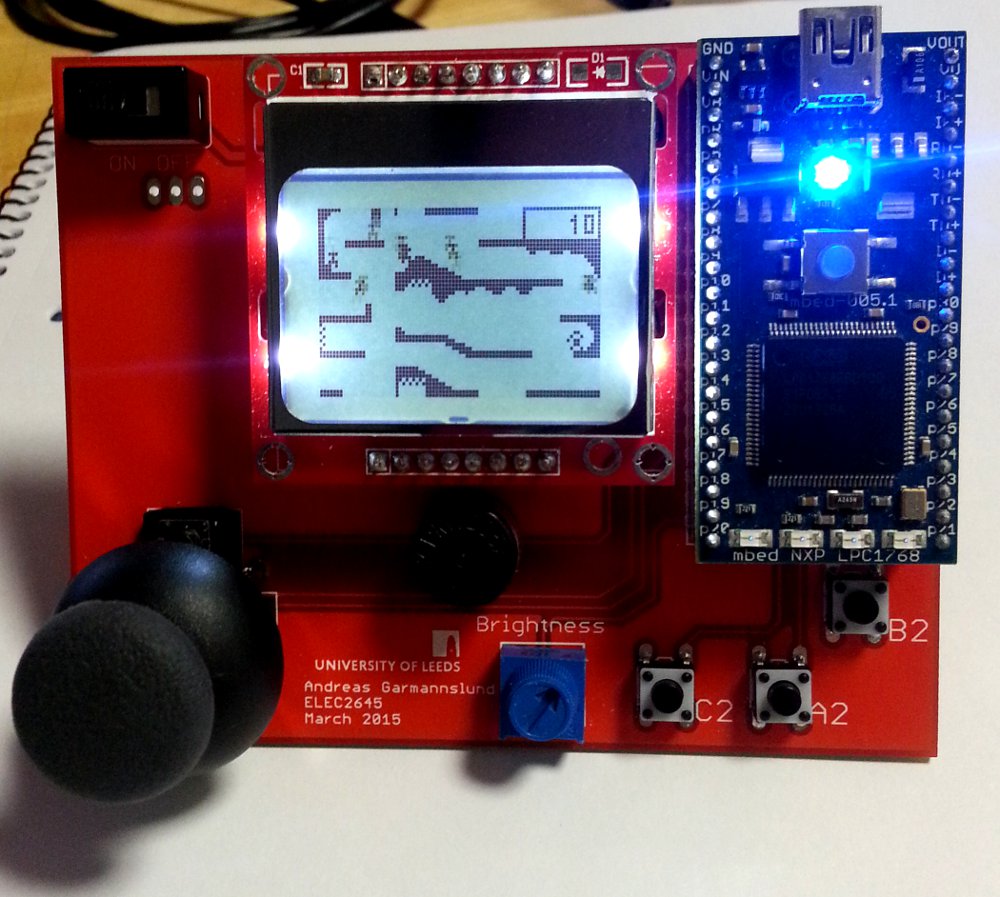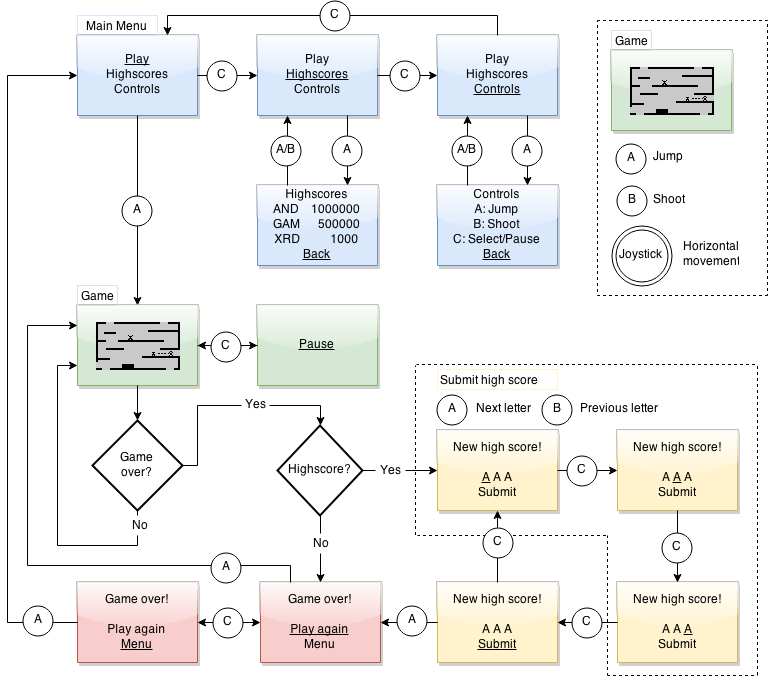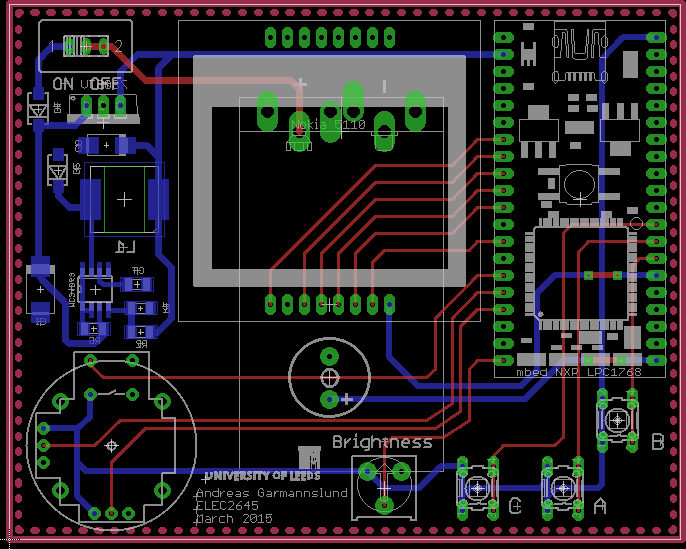A simple one-level platform game. Developed as part of ELEC2645 at University of Leeds, spring 2015.
Dependencies: N5110 PinDetect PowerControl mbed
An ARM mbed LPC1768 microcontroller have been used to develop a handheld arcade game in the style of an old-school platformer. This project is entirely my own independent work in all stages of the development; including design, defining project specifications, breadboard prototyping, schematic and PCB layout using CAD, assembly, testing and software development. Due to this being part of the ELEC2645 Embedded Systems Project module at University of Leeds, spring 2015, limitations were given on the available hardware components. Credit is due to the authors of the dependent libraries (N5110, Pin Detect, PowerControl and mbed). I would also like to thank the author of Game Programming Patterns as well as the authors of SFML Game Development for providing me with useful sources for programming design patterns.

Project aims
- Implement simple gameplay:
- A single, fixed (no scrolling) level.
- Player can move left to right, jump and shoot.
- Enemies will drop from the top of the screen.
- The player gets points for shooting enemies.
- The player dies when it gets hits by an enemy.
- Implement a simple menu system.
- Enable the user to adjust the brightness of the display.
- Output sound to enhance the user experience.
Software
The program flow is controlled by a finite state machine. The implemented design was inspired by the State design pattern from the books Game Programming Patterns and SFML Game Development. The StateManager class is responsible for updating and rendering the current selected state. It also changes the state based on request from the current state. The framework built for the state machine used in this project makes it easy to add new screens.
The different main states (indicated by the background colour) and how the user interaction is shown below:

Hardware
Schematic:

Printed circuit board (PCB):

Images
A seperate program was written to convert images (png) to text-representation of the maps. Enemies and numbers on the screen are also collected from a sprite-sheet created in the same manner.


Diff: main.cpp
- Revision:
- 1:0cfe2255092a
- Parent:
- 0:1f92de30d43e
- Child:
- 2:0ae5ac8b0cac
diff -r 1f92de30d43e -r 0cfe2255092a main.cpp
--- a/main.cpp Sun Apr 26 17:20:09 2015 +0000
+++ b/main.cpp Tue Apr 28 12:46:37 2015 +0000
@@ -6,40 +6,67 @@
#include "mbed.h"
#include "N5110.h"
+#include "PowerControl.h"
+#include "PinDetect.h"
+
#include "Joystick.h"
+#include <string>
+
+#include "State.h"
+#include "MainMenu.h"
#include "map.h"
+#include "images.h"
+
#include <ctime>
+// Redefine pin names for simple access.
+#define JOY_H p17
+#define JOY_V p16
+#define JOY_BTN p15
+
+#define LED_POT p20
+
+#define BUTTON_A p27
+#define BUTTON_B p28
+#define BUTTON_C p29
+
+enum MainState {MENU, GAME};
+MainState currentState; // current state
+
// Components
N5110 *lcd; // VCC, SCE, RST, D/C, MOSI, SCLK and LED
Joystick *joystick;
// Brightness potentiometer
-AnalogIn ledPot(p20);
+AnalogIn ledPot(LED_POT);
+/*
// Buttons
DigitalIn btnA(p27);
DigitalIn btnB(p28);
DigitalIn btnC(p29);
+*/
// Debugging
Serial pc(USBTX, USBRX);
BusOut leds(LED1, LED2, LED3, LED4);
-// @brief Clears the screen and fill it with the static map layout.
-void clearAndRedrawMap()
+
+// @brief Clears the screen and fill it with the image in the argument.
+void clearAndDrawImage(const int img[BANKS][WIDTH])
{
for (int i = 0; i < BANKS; ++i)
{
for (int j = 0; j < WIDTH; ++j)
{
- lcd->buffer[j][i] = map[i][j];
+ lcd->buffer[j][i] = img[i][j];
}
}
lcd->refresh();
}
-int main()
+State *stateObj; // current state object
+void init()
{
// Init LCD
lcd = new N5110(p7, p8, p9, p10, p11, p13, p26);
@@ -48,25 +75,57 @@
lcd->setBrightness(1.0 - ledPot); // Update brightness of screen
// Init joystick
- joystick = new Joystick(p17, p16, p15);
+ joystick = new Joystick(JOY_H, JOY_V, JOY_BTN);
joystick->calibrate();
- // Game loop
+ // Set initial state
+// currentState = MENU;
+// stateObj = new MainMenu(lcd, BUTTON_A, BUTTON_B, BUTTON_C);
+}
+
+void cleanUp()
+{
+ delete lcd;
+ delete joystick;
+ delete stateObj;
+}
+
+const int NUM_CHOICES = 3;
+std::string choices[NUM_CHOICES] = {"Play", "High Score", "Controls"};
+int selectedChoice = 0;
+
+PinDetect btnC(BUTTON_C);
+void nextChoice() { selectedChoice = (selectedChoice + 1) % NUM_CHOICES;}
+
+int main()
+{
+ init();
+
+ // button
+ btnC.attach_asserted(&nextChoice);
+ btnC.setSampleFrequency();
+
+ // Game loop, fixed-time step, updates game logic with regular intervals, rendering happens as fast as possible
while(true)
{
- clearAndRedrawMap();
+ lcd->clear();
+ //stateObj->run();
+
joystick->update();
- pc.printf("Joystick direction: %d\n", joystick->getDirection());
-
lcd->setBrightness(1.0 - ledPot); // Update brightness of screen
- wait (0.1);
+ for (int i = 0; i < 3; ++i)
+ {
+ std::string str = (selectedChoice == i) ? ("> " + choices[i]) : choices[i];
+ lcd->printString(str.c_str(), 10, i+1);
+ }
+
+ lcd->refresh();
+ Sleep(); // Wait for button interrupt
}
- delete lcd;
- delete joystick;
+ cleanUp();
return 0;
-}
-
+}
\ No newline at end of file
 Andreas Garmannslund
Andreas Garmannslund